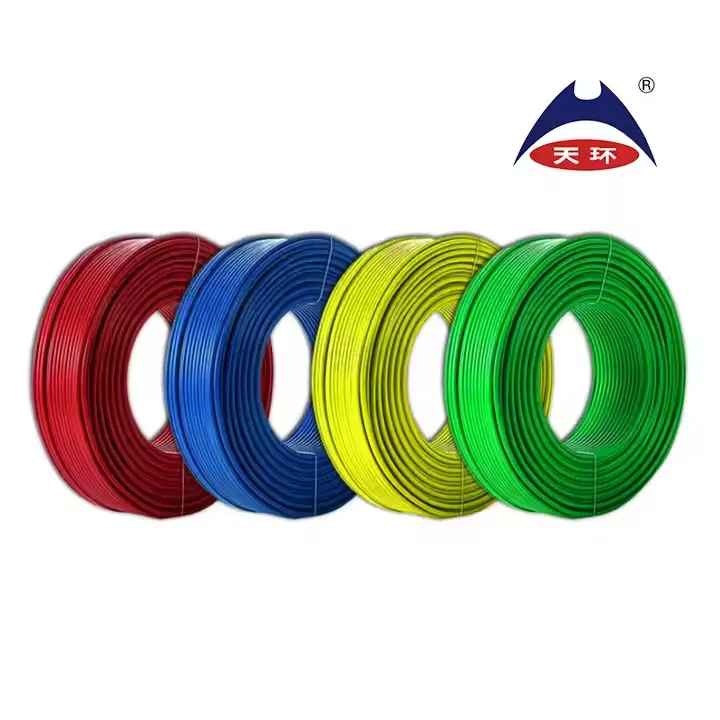
Understanding Construction Cables
Construction cables are essential for transmitting power and signals in residential, commercial, and industrial projects. They come in various materials, insulation types, and sizes to suit different electrical and structural needs.

Types of Construction Cables
- Power Cables– Used for high-voltage power transmission in buildings and infrastructure.
- Control Cables– Designed for signal transmission in automation and electrical control systems.
- Flexible Cables– Ideal for applications that require bending and movement.
- Armored Cables– Provide extra protection against mechanical damage, commonly used in underground wiring.
- Fire-Resistant Cables– Used in buildings requiring enhanced safety standards.
Cable Wire Construction & Materials
Construction cables are made of:
- Copper or Aluminum Conductors– Copper is preferred for its superior conductivity, while aluminum is lighter and more cost-effective.
- PVC, XLPE, or Rubber Insulation– Provides durability and protection against heat and moisture.
- Shielding & Armor– Additional layers to protect against electromagnetic interference and mechanical damage.
Finding the Right Cable Construction Company
A cable construction company should offer:
- High-quality materials that meet industry standards.
- Custom cable solutions for specific project needs.
- Competitive pricing and bulk order options.
- Reliable after-sales support and technical guidance.
Choosing a Supplier for Electrical Cable Construction
- Verify Certifications– Ensure the supplier meets safety and performance regulations.
- Check Cable Specifications– Match the cable type with your project requirements.
- Compare Prices & Warranties– Look for competitive pricing with quality guarantees.
- Read Customer Reviews– Reliable suppliers have positive feedback and industry recognition.
Whether you're working on a small residential project or large-scale infrastructure, selecting the right construction cable is crucial for safety and efficiency. Work with a trusted cable construction company to ensure high-performance solutions for your electrical needs.
Construction Cable FAQs
Q1: What is construction cable, and where is it used?
A1: Construction cable refers to electrical cables specifically designed for use in residential, commercial, and industrial buildings. They are used for power distribution, lighting, control systems, and communication lines, ensuring safe and efficient operation of electrical systems.
Q2: What are the main types of construction cables?
A2: The main types include power cables, control cables, armored cables, fire-resistant cables, and flexible building wires. Each type serves different purposes based on voltage capacity, environmental resistance, and installation needs.
Q3: How do I choose a reliable cable construction company?
A3: A trusted cable construction company should offer certified products, a wide range of cable types, the ability to handle bulk or custom orders, competitive pricing, and strong customer support. Checking reviews and certifications like ISO and CE can help ensure reliability.
Q4: What is the difference between flexible building wire and standard wire?
A4: Flexible building wire is made to bend and move easily without breaking, often used in dynamic or tight-space installations. Standard wires are more rigid and used for permanent, fixed installations within walls, ceilings, or conduits.
Q5: What factors affect the cost of electrical cable construction?
A5: The cost depends on the type of conductor (copper is pricier than aluminum), insulation material, cable size (gauge), voltage rating, and whether it's armored or fire-resistant. Bulk purchasing from direct cable wire construction suppliers can also reduce costs.
-
The Quantum Leap of XLPE Cable in Power DistributionВестиMay.29,2025
-
Mastering the Essentials of Building WireВестиMay.29,2025
-
Innovative Horizons of Rubber Trailing CablesВестиMay.29,2025
-
Exploring the Versatile World of Rubber CablesВестиMay.29,2025
-
Decoding the Mysteries of Building CablesВестиMay.29,2025
-
Advancements Redefining Control Cable TechnologyВестиMay.29,2025
-
Why It's Time to Replace Old Rubber CablesВестиMay.28,2025














